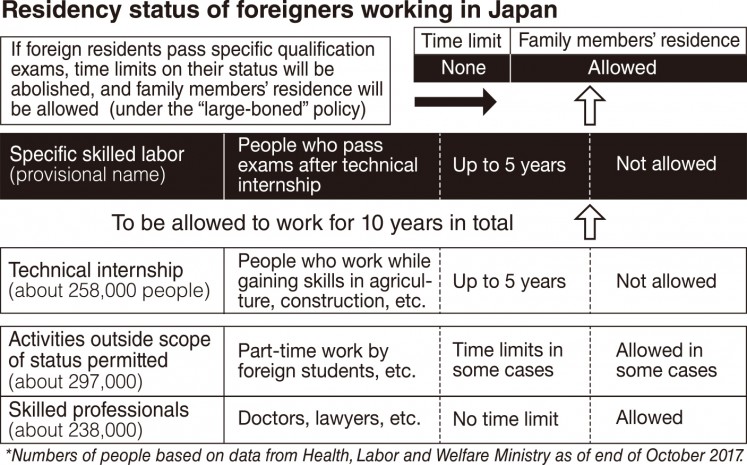Popular Reads
Top Results
Can't find what you're looking for?
View all search resultsPopular Reads
Top Results
Can't find what you're looking for?
View all search resultsJapanese firms back boost in foreign workers
Cabinet approval of a bill to accept more foreign workers were welcomed by business sectors who have been suffering from serious labor shortage.
Change text size
Gift Premium Articles
to Anyone
B
usiness sectors suffering from a serious labor shortage reacted positively to Friday’s Cabinet approval of a bill to accept more foreign workers. But companies are expected to face hurdles on how to prepare for the influx of hundreds of thousands of foreign workers in such areas as education and training.
At a training facility for foreigners in Tokyo established by Ten Allied Co., operator of the Tengu Sakaba izakaya restaurant chain, the voices of a group of students from Vietnam aged 19 and 20 filled the room. They were practicing their formal greetings and other set phrases in Japanese for dealing with customers.
“I’m sorry to have kept you waiting so long,” the group said in a loud chorus. It is the restaurant chain’s rule to add “so long” when it takes eight minutes or more to get the meal to the table.
Ten Allied employs about 2,800 workers, and about 700 of them are Vietnamese. “It’s impossible to operate our restaurants without foreign workers,” said Tomofumi Shiokawa, who is in charge of employee training.
Foreign workers receive intensive training on the correct manners for interacting and talking with customers. Nguyen Van Tuan — the first Vietnamese regular employee of Ten Allied — said, “I had always admired Toyota [Motor Corp.], so that’s why I came to Japan.” The 28-year-old added, “I want to work here for a long time.”
The seasonally adjusted ratio of job openings to job seekers hit 1.64 in September, the highest level in about 45 years. The labor shortage has already had an effect on company operations, such as family restaurant chains ceasing around-the-clock operations and construction projects being delayed.
Against such a backdrop, the number of foreign workers has been increasing year by year. According to the Health, Labor and Welfare Ministry, there were about 1.28 million foreign workers in the country in October 2017. Among them, those granted residence status to work because of their recognized skills for specialized labor accounted for about 240,000. Technical interns and foreign students working part-time are underpinning the front line of workplaces suffering labor shortages, such as in the restaurant, construction and manufacturing sectors.
However, the official objective for the technical internship system is Japan’s international cooperation. In principle, interns’ stay is limited to five years. Foreign students are also limited in how much they can work, set at 28 hours a week.
Japan plans to abolish limits on the term of residence for foreign workers. (The Japan News/File):
Preparation is key
For this reason, employers have anticipated the expansion of accepting more foreign workers, including unskilled laborers. However, some experts are concerned that the preparation work for the expansion in April might not be completed on time.
The government considers Japanese language proficiency and a certain level of knowledge and skill as conditions to be accepted. The biggest challenge is how to train the workers to fulfill the conditions.
Sompo Care Inc., which operates about 300 nursing care facilities for elderly people nationwide, has accepted only two people from Vietnam as trainees under the technical intern training program in fiscal 2018. An official of the company said that accepting such a trainee requires allocating a full-time employee to take care of the trainee from a very basic level, and that makes it difficult to accept trainees in larger numbers. “Simply increasing the number of the trainees would result in the carers become exhausted,” the official said.
In fact, there are many cases of trainees having trouble with Japanese colleagues because of differences in culture or custom. Companies that have already accepted foreigners share common challenges on preventing them from leaving their jobs and having them work for the company for a long time.
Various concerns
According to a Mizuho Research Institute forecast, Japan’s labor force will decrease from 67.2 million in 2017 to 58.8 million in 2030. The situation in which foreign workers cover the labor shortage will possibly continue for a while.
Meanwhile, it is difficult to predict how the development of artificial intelligence or robotics will affect the employment situation. The Nomura Research Institute has predicted that nearly half of workers might be replaced by artificial intelligence around 2025 to 2035.
“It is no good to increase [foreign workers] gradually [without amending the system] just because there is a shortage,” Chairman Yoshimitsu Kobayashi of the Japan Association of Corporate Executives (Keizai Doyukai) said at an Oct. 16 press conference. “Even if the employment situation changes to one of surplus, it would definitely not be easy to force them to return to their home countries.”
Some experts have said that simply increasing the number of workers to address the imminent issue of labor shortages is likely to hinder advances in work efficiency and productivity. The experts have also said that strictly keeping the wages of foreign workers at or above the level of Japanese workers might lower wages overall, including those for Japanese workers.
Another issue is that the employment situation may not be the same after the 2020 Tokyo Olympic and Paralympic Games. It is expected in the construction industry that there would be a drop in demand following the end of the Games.
“The employment situation is unstable in the construction industry, which is greatly influenced by boom-and-bust cycles,” a senior official of the Japan Federation of Construction Contractors said. “We need to talk more about the system, such as allowing [foreign workers] to work in other industries that were not initially designated as accepting them [under the new program].”
This article appeared on The Japan News newspaper website, which is a member of Asia News Network and a media partner of The Jakarta Post











